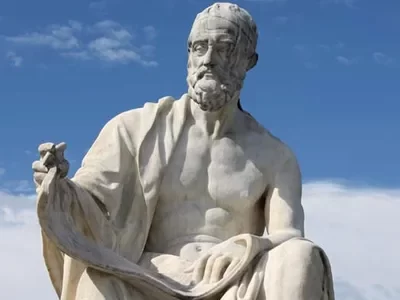Who was Polybius? (200?-118?BC) Polybius was the most prominent early Greek historian of Rome, who sought to explain and justify the rapid Roman rise to world domination. He was carried captive to Rome, adopted by a Roman family and rose to prominence in the Roman bureaucracy.
Historical context. The Macedonian king Phillip and his son Alexander came to power in northern Greece by virtue of their unique infantry tactics. They equipped their soldiers with 14-foot spears and deployed them in a tightly knit Phalanx formation that was virtually impenetrable. Thus, they forced the submission of the southern city-states in 338 BC. Phillip was assassinated in 336, but Alexander embarked on an astonishing military campaign, conquering Persia, Egypt, Afghanistan before finally being halted in India. He left Greek cultural and military outposts in his wake, but died without an heir in 323. BC. He is known to history as Alexander the Great.
Upon Alexander’s death, the kingdom was divided among his four generals, who quarreled incessantly. Greek rulers were given virtually despotic authority over local populations, a practice which offended the democratic traditions of the original city-states. During the second century BC, a delegation from mainland Greece appealed to the growing power of Rome for assistance. Rome intervened at the Battle of Pydna in 168 BC and declared the city-states liberated; in practice a freedom to govern themselves as long they didn’t disobey Rome. Greece rebelled and Roman armies sacked Corinth in 146 BC, establishing Roman governors throughout the Greek mainland. Rome completed her conquest of the Grecian Empire with the defeat of Egypt in 31 BC.
Summary of Polybius’ teaching. At first the Greeks resented Rome’s new taxation and relocation policies, but gradually they became reconciled to Roman rule. Greek leaders became members of the Roman Senate and tutors of Roman children. Romans flocked to Greek universities and cultural sites, so tourism became a staple of the Grecian economy. One of Polybius’ objectives was to persuade his countryman of the advantages of Roman rule.
Polybius was an early example of Roman expatriation. Prior to the rebellion of 146, Polybius’ activity as a senior cavalry officer in the Achean League aroused the suspicions of Rome and led to his deportation. In Rome he became a private tutor and aide in the family of a prominent legionnaire, Scipio Aemilianus. He accompanied the army to various theaters and was present at the destruction of Carthage during the Third Punic War in 146 BC. After the defeat of the Achaean League and Corinth that same year, he was assigned the responsibility of reorganizing the region under Rome.
Polybius’ style is very objective and therefore dry. Like Thucydides he seeks to draw conclusions for leadership from his historical observations of contemporary events and from his analysis of the Roman constitution. And like Thucydides before him he made up some speeches, knowing that for the Greeks powerful rhetoric was a stimulus to powerful action. Likewise, he reinforced Thucydides tendency to emphasize the political and military at the expense of economic and other cultural factors.
A prominent example of Polybius’ didacticism is found in Book VI of his Universal History, where he outlines six forms of government, three desirable, and their corresponding corruptions. The three desirable forms – kingship, aristocracy and democracy – had been incorporated into the Roman constitution to give it the strength of an alloy. According to Polybius, this unique form of government had endowed Rome with the capacity to conquer the world in an extremely short period of time. “Be moderate in your prosperity,” he recommended, “because it will be remembered in your favor. And he implied that even imperial power was subject to an ethical criterion” (1).
Implications for subsequent history. Polybius’ description of a mixed government had a profound influence on the American founders. “John Adams frequently spoke of him, and it is principally because of Polybius that the constitution of the United States contains the separate powers, limited by a system of balances and checks, which have contributed so largely to its continuing strength” (2). In addition, Polybius is our best source of Roman origins and the foundation on which subsequent Roman histories are built.
Paradoxically, Polybius and other ancient historians tended to justify the exercise of power based on the accumulation of lands and property, rather than a covenant commitment to justice administered according to the Word of God. They passed this lethal tendency on to their philosophical descendants among the British Commonwealth Men in 18thCentury England. “…anyone who read Thucydides, Polybius, Livy, and Plutarch was likely to find in them the same doctrine of dominion and wealth which Harrington and Neville professed” (3).
Biblical analysis. On the contrary, it is according to the mercy of God that “a spirit of justice” be given “to him who sits in judgment” (Is 28:6). The purpose of a mixed government is to prevent the concentration of power in the hands of a single individual; the temptation to abuse unlimited power is simply too great. One king may resist it, as was the case with England’s Edward the Confessor, but inevitably he will produce a son or grandson such as Edward I, who will trample all right underfoot to satisfy his quest for power.
Saul was such a king, and we find instances in the Bible where the congregation acting as a body exercised its independent authority to restrain his excesses: “And the people said unto Saul, Shall Jonathan die, who hath wrought this great salvation in Israel? God forbid….” Rome herself became a negative example of this principle as the Republic gave way to the Empire and the Senate surrendered more and more of its power to Caesar.
However, it is noteworthy that the Hebrew Republic does not seem overly concerned about division of power in a mixed government. The executive and judicial powers were united in a King or Judge, such as David. The legislative branch was reduced to an advisory capacity such as the 70 elders who assisted Moses. This was because God had given the law in its perfect form and it cannot be improved. Greater importance is given to the proper relation of “church and state,” with church legal experts serving as counselors to the judge in the courts of law (Dt. 17:9, II Chr 19:8).
Corrective or Prescriptive Actions. The greater restraint on the magistrate is, of course, allegiance to God and His word, as David was reminded by the Lord Himself: “He that ruleth over men must be just, ruling in the fear of God” (II Sam. 23:3).


